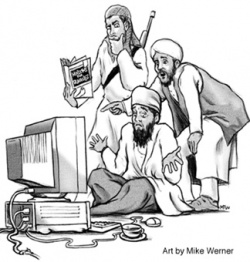Cyberterrorism
(“terrorism”) | |
|---|---|
 | |
| Interest of | • Bilderberg/2019 • Carnegie Cyber Policy Initiative • Cyber Threat Intelligence Integration Center • Europol • Matthijs Veenendaal |
| Subpage(s) | •Cyberterrorism/Preparation |
| The use of computers by terrorists to cause disruption. | |
Cyberterrorism, like terrorism, is a rather loosely defined term which has been criticised by authoritative computer security specialists[1]. It is generally invoked by the commercially-controlled media, often rather implausibly, to suggest that unless governments have strict control over the internet, bad things will happen.
Contents
Prevalence
In September 2014 Bloomberg reported on a honeypot that two researchers established to investigate the sources of cyberterrorism. They reported that most cyber attacks on it were from US, followed by China, Russia and Netherlands in that order.[2]
Internet use by terrorists
Increasingly, the threat of internet use by terrorists is claimed as justification for internet censorship. In 2014, the head of counter-terrorism at Scotland Yard, Assistant Commissioner, Mark Rowley stated "There are some different dynamics today, where we have an increasing number of people who weren't previously on the terrorism radar being attracted by an ideology they see on social media". He also claimed that counter-terrorism officers were removing more than 1000 online postings a week.[3]
By Intelligence agencies
- Full article: Malware
- Full article: Malware
Various malware has attracted the attention of anti-virus companies and a very small percentage is of such complexity, combining so many different techniques, that it is widely suspected to have been produced by government sponsored intelligence agencies. Notable examples include Stuxnet (2010, widely considered created by the NSA and the Mossad), Duqu (2011) and in November 2014 Regin.
DDOS Attacks
Various DDOS attacks have been launched against the internets 13 root name servers (on 30 November 2015, 6 February 2007, and 21 October 2002). Their scale and duration (the 30 November 2015 attack lasted 48 hours) prompted the suggestion that "only a government could have this much clout"[4]
An example
| Page name | Description |
|---|---|
| Denial-of-service attack | An attack that makes a large number of (bogus) requests on a server, intended to exceed its capacity so as to deny valid requests from other users. |
Related Quotations
| Page | Quote | Author | Date |
|---|---|---|---|
| Corporate media/Mendacity | “More and more we are seeing narratives about cyber-threats being used to advance reports of “attacks” and “acts of war” being perpetrated which, as far as the public is concerned, consist of nothing other than the authoritative assertions of confident-sounding media pundits. There was a recent NBC exclusive which was co-authored by Ken Dilanian, who is an actual, literal CIA asset, about the threat of hackers working for the Iranian government. The alleged Russian interference in the 2016 US elections is now routinely compared to Pearl Harbor and 9/11, despite no hard, verifiable evidence that that interference even took place ever being presented to the public.” | Caitlin Johnstone | 11 August 2018 |
| "Philip Cross" | “My view is that Philip Cross probably is a real person, but that he fronts for a group acting under his name. It is undeniably true, in fact the government has boasted, that both the MOD and GCHQ have “cyber-war” ops aiming to defend the “official narrative" against alternative news media, and that is precisely the purpose of the “Philip Cross” operation on Wikipedia. The extreme regularity of output argues against “Philip Cross” being either a one man or volunteer operation. I do not rule out however the possibility he genuinely is just a single extremely obsessed right wing fanatic.” | Craig Murray "Philip Cross" | 21 May 2018 |
| Sharmine Narwani | “My friend, an engineer — who I will not name for obvious reasons and who I will call ‘Kourosh’ for the purpose of this article — revealed to me in 2010 that he was approached by two “State Department employees” who offered him $250,000 to “do something very simple” during his upcoming trip to Tehran.” | Sharmine Narwani | 21 March 2019 |
| TSA | “El Reg: "Sonic Screwdriver is cleared aimed at molesting seized machines, or during black bag operations, not at interfering with factory-fresh products in transit."
Do it at airports during a customs inspection. Take the computer out of the owner's sight and install whatever you want. Or better still, come up with some sort of bogus excuse to force everyone to put their laptops in checked baggage, and then do it in the baggage handling process. That way the subject wouldn't know they had been targeted. Not that anyone would ever dream of doing something as disruptive as arbitrarily forcing people to check their laptops of course...” | 23 March 2017 |
Related Document
| Title | Type | Publication date | Author(s) | Description |
|---|---|---|---|---|
| Document:Iain Lobban Address | speech | 12 October 2010 | Iain Lobban | Mr Lobban addresses a selected audience of journalists, opinion formers, government officials, academia and industry representatives on issues related to cyber security and the threat posed by cyber attacks. |
An official example
| Name |
|---|
| Kaspersky |
References
- ↑ https://www.schneier.com/blog/archives/2014/12/nsa_hacking_of_.html
- ↑ http://www.bloomberg.com/news/2014-09-23/a-decoy-computer-was-set-up-online-see-which-countries-attacked-it-the-most.html
- ↑ http://www.bbc.com/news/uk-29649010
- ↑ http://www.ibtimes.co.uk/mysterious-hackers-are-trying-bring-down-entire-internet-by-ddos-ing-critical-servers-1532762